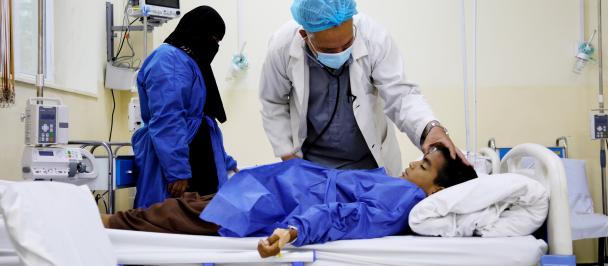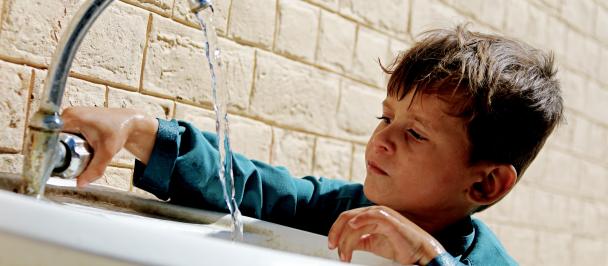The only thing tougher than the farm, is the farmer.
Growing Success
November 17, 2022

Kubra and her team processing Yogurt for packing
In a small office in the corner of her farm shop on the outskirts of Herat, western Afghanistan, Kubra Khawari is very busy - setting plans, greeting guests, and advising other food processing technicians like herself. She is the chairperson of an 18-member women farmers' association.
She is a successful businesswoman but has also known adversity. Kubra grew up in Iran as a refugee, but her studies were cut short there as she was not allowed to attend university.
“As Afghans, we were not allowed to study there. I couldn’t continue my education. Some years later, I plucked up the courage to return to my homeland, Afghanistan. We settled in Bamyan at first, which was my hometown, but it was not safe there because of the ongoing conflict. It wasn’t easy to find a job there either. We eventually moved to Herat, which has larger markets and better opportunities.”
Herat province shares international borders with Iran and Turkmenistan and is a regional trade hub. In recent years, its population has rapidly increased due to a million unregistered Afghans being sent back from Iran and internally displaced families from neighbouring provinces coming here to escape disasters such as earthquakes, droughts, and floods. The growing population meant thriving markets and high demand for Herat's agricultural products. Greenhouses began to spring up, providing a year-round growing season while being an eco-friendly and sustainable farming solution in an area prone to droughts.
Kubra grasped this opportunity and set up a small vegetable and dairy processing enterprise with like-minded women. They invested in three greenhouses to grow cucumbers, tomatoes, and melons to be preserved and sold.
The enterprise did well for several years until the sudden power shift in August 2021. Almost overnight, the country fell into economic chaos, and many small and medium enterprises (SMEs) like Kubra’s began to struggle.
“Our company had to stop trading due to the worsening economy. We had no electricity, rental space, or raw materials. Most painfully, we had no idea whether women would be allowed to work anymore. I sold my greenhouses and fled to Iran.”
After monitoring the situation for six months, Kubra decided to return and restart her business. She began by selling fresh milk. By collecting milk at the farm gate, she was able to help other female farmers who could not bring their product to market.
Around September this year, her enterprise was selected under a joint initiative run by UNDP and UNHCR, supporting returning Afghan refugees and internally displaced people. Kubra received a grant to purchase new equipment: plastic sheets for greenhouses, a solar panel, cold and warm storage to process yogurt, and a packaging machine.
“The support we received expanded our production and added value to our products,” says Kubra. “Since then, we have employed five more women. Now we produce and sell 4,000 litres of yogurt and 1,500 bottles of pickled vegetables every month. We are expecting high profits this year”.
She continued, “Now that our products are packed professionally, we can sell them to a wider range of customers, such as restaurants, hotels, and groceries, for more profit.” Although we employ men and women for marketing, we notice that women are more persuasive to our clientele. Our products may be pricier than our competitors, but we invest in quality and freshness, which pays off”.
UNDP has extended financial assistance to other small and medium-sized enterprises (SMEs) to support their business expansion, providing employment prospects for internally displaced people, returnees, and host communities in Herat. There are 22 grant recipients in the Herat region.
Kubra’s company was selected not only because of its financial requirements, but also because of her impressive understanding of business management. Although she only completed secondary school, she was familiar with production, marketing, and customer analysis. Her leadership as the head of the women’s farmer’s association, and her skill in managing members from different backgrounds and regions was recognised.
Hamida Mohammed Ali, an association member, praised the company, saying, “My husband is unemployed. Before, we lived in a basic house with no income, but now I make 15,000 Afg (170 USD) monthly and rent a better house.”
Kubra is a good example of the resilience and business acumen of women who are running enterprises in Afghanistan. She says, “We as women are strong enough to demand and practice our rights; I don’t feel any limitations compared to men. I want to continue to expand this enterprise and diversify my production.”
Supporting women SMEs is central to UNDP’s ABADEI (Area-Based Approach for Development Emergency Initiatives) strategy. Through ABADEI, UNDP Afghanistan is on its way to helping more than 50,000 SMEs through financial and technical support to recover, strengthen and expand their enterprises, and create market access and linkages.
This UNDP-UNHCR joint project also provides durable solutions to mitigate further displacements by responding to their livelihood needs. It is part of the UNDP-UNHCR Partnership in the Priority Areas of Return and Reintegration (PARRs) programme, under the Solutions Strategy for Afghan Refugees (SSAR) framework, which aims to enhance capacity and create the enabling conditions for sustainable reintegration in Afghanistan.
The project was realized through the generous support from the #PartnersAtCore, a pooled funding to UNDP that allows us to respond quickly and flexibly in times of crisis. #PartnersAtCore has been vital in supporting Afghanistan, battling a double humanitarian and development situation, by addressing its socio-economic impact, strengthening community resilience, and tackling structural inequalities.
As Afghans, we were not allowed to study there. I couldn’t continue my education. Some years later, I plucked up the courage to return to my homeland, Afghanistan. We settled in Bamyan at first, which was my hometown, but it was not safe there because of the ongoing conflict. It wasn’t easy to find a job there either. We eventually moved to Herat, which has larger markets and better opportunities.Kubra Khawari

 Locations
Locations



